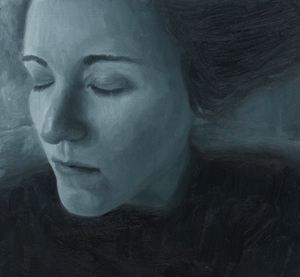Jodi Bassett

Jodi Bassett was living with Myalgic Encephalomyelitis (ME) when she founded The Hummingbirds' Foundation for ME, an online educational and advocacy site. She was an Australian artist, graphic designer, writer and patient advocate.
Illness
According to her website: "In 1995, at the age of 19, Jodi went from being healthy and happy one day, to very ill and disabled with the neurological disease Myalgic Encephalomyelitis (M.E.) the next. When first ill, Jodi was reduced to only being able to be 40% as active as pre-illness. Due to inappropriate medical advice leading to sustained overexertion (which causes serious and permanent bodily damage in M.E.) Jodi’s illness quickly went from moderate to extremely severe. By 1999 she was capable of less than even 5% of her pre-illness activity level." She did her advocacy work in bed with a laptop.[1]
Jodi died in June 11, 2016 at home from secondary Breast Cancer. Her ME at the time was doing quite well and she was no longer housebound.[2]
Books
Bassett authored several books:
- Caring For The M.E. Patient by Jodi Bassett, with a Foreword by Dr Byron Hyde. "This book provides essential information for anyone who knows, loves or provides care for someone with M.E. - sourced from the world's leading M.E. experts."[3]
- What Is M.E.? (booklet) by Jodi Bassett, with a Foreword by Dr Byron Hyde "What is M.E.? contains essential information on the neurological disease M.E. sourced from the world’s leading M.E. experts - in the form of a concise 70 page booklet."[4]
- Super Cute, Vicious, Dreamy Cats "This book contains a selection of oil paintings featuring cats by Australian artist and patient advocate Jodi Bassett. Several self portraits and hummingbird egg paintings are also included." [5]
Booklets
Jodi also wrote four booklets available for free download in Word or PDF formats:[6]
- What is M.E.? by Jodi Bassett
- Practical tips for living with M.E. by Jodi Bassett
- The CBT and GET Database by Jodi Bassett
- The Health, Healing & Hummingbirds ebook by Jodi Bassett.
Talks and interviews
Online presence
See also
Learn more
References
- ↑ "About HFME". The Hummingbirds' Foundation for M.E. Retrieved August 30, 2018.
- ↑ "ME/CFS Australia (SA) Inc: Jodi Bassett". sacfs.asn.au. June 14, 2016. Retrieved August 30, 2018.
- ↑ "HFME books". The Hummingbirds' Foundation for M.E. Retrieved August 30, 2018.
- ↑ "HFME books". The Hummingbirds' Foundation for M.E. Retrieved August 30, 2018.
- ↑ "HFME books". The Hummingbirds' Foundation for M.E. Retrieved August 30, 2018.
- ↑ "HFME books". The Hummingbirds' Foundation for M.E. Retrieved August 30, 2018.
- ↑ Bassett, Jodi (May 22, 2007). "How does M.E. affect my life?". YouTube.
- ↑ Bassett, Jodi (December 31, 2008). "What getting M.E. feels like (to me)". YouTube.
- ↑ "The Hummingbirds' Foundation for M.E." hfme.org.
- ↑ Bassett, Jodi. "A HummingbirdsGuide Videos". YouTube.

